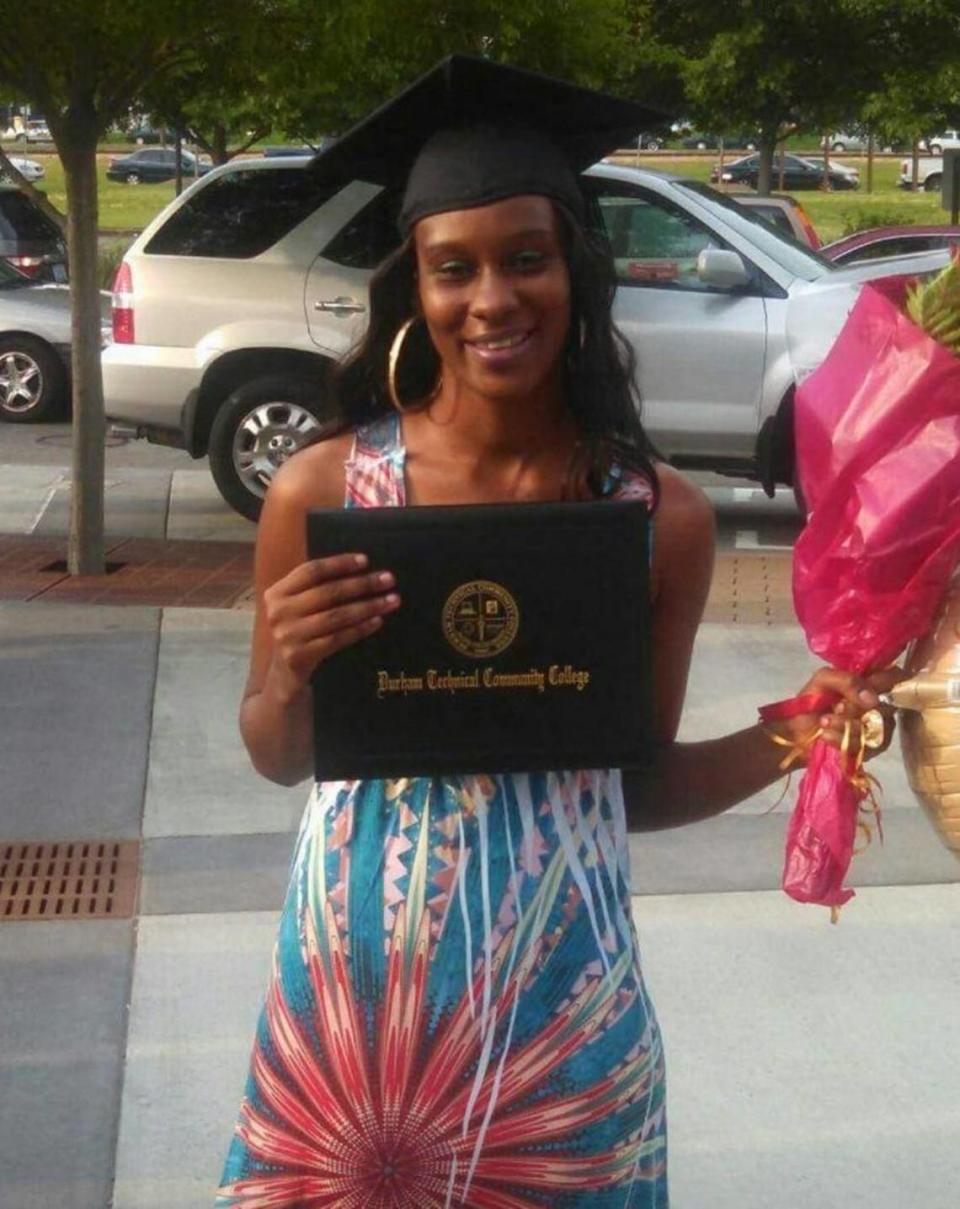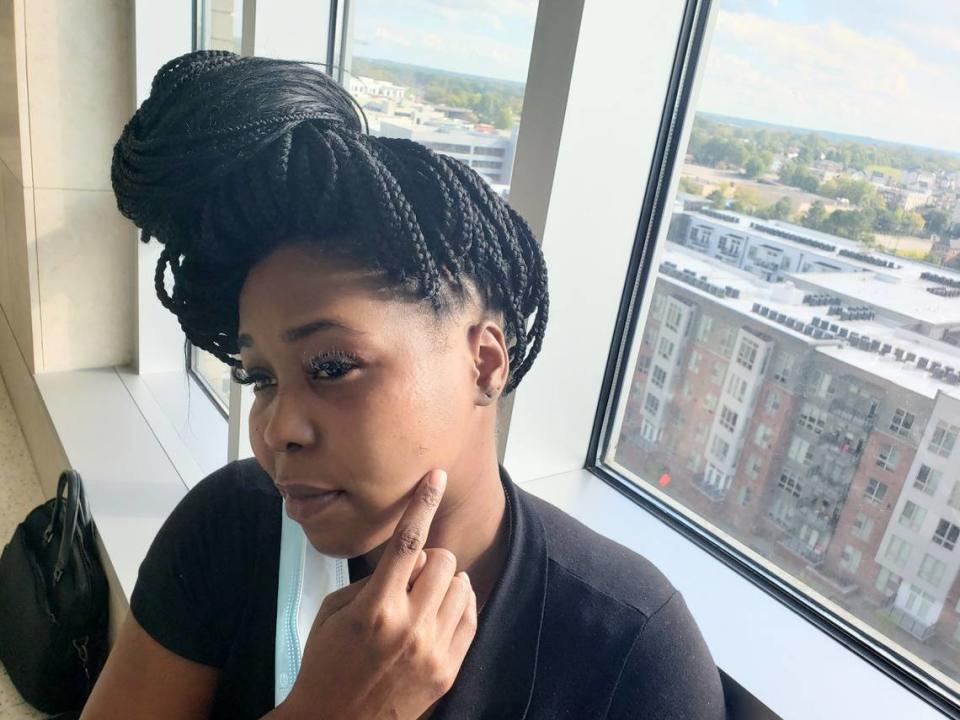‘You said you loved her.’ Can a few questions help stop NC domestic violence killings?
Todra Thornton had finally relented to letting her best friend and her boyfriend stay at her house.
“Come on, man, let me and Rico stay,” Erika Desiree Downey had pleaded in September 2016, Thornton said. “I was like, all right.”
Thornton picked up the couple, Downey and Larico Fonyte Dunn, and brought them to her apartment. There, she stayed in her room, but heard them fighting when she went to the kitchen for a bowl of cereal.
“I was like, ‘Girl, y’all crazy,’” she said and walked back to her room, Thornton told The News & Observer.
About 10 minutes later, Thornton heard “Pop! Pop!”
“I just slung the door open, and I was like ‘What the hell?’” Thornton said.
Downey was coming down the hallway, almost falling forward as Dunn followed, shooting, Thornton said. One bullet grazed Thornton’s cheek. Another hit her in the buttocks.
Dunn shot Downey in the back and then stood over her and shot her in the face, a prosecutor said in court this week.
After Dunn ran out, Thornton called 911 and applied pressure to her friend’s wounds as she died in Thornton’s arms.
“She was my only friend,” Thornton said. “I had her back, and she had mine.”
Thornton spent three days in the hospital.
On Monday, Dunn, 29, pleaded guilty to second-degree murder for the domestic violence killing, along with assault with a deadly weapon with intent to kill causing serious injury and three other charges. The plea deal will put him in state prison for 30 to 38 years .
Instead of bringing resolution for the family during the final week of Domestic Violence Awareness Month, the hearing and Dunn’s behavior in the courtroom — he refused to look at Downey’s family and interrupted her mother with an outburst — brought disappointment and worry.
“He’s a walking time bomb,” said Erika’s mother, Wanda Elaine Downey. “If you let him out, he will do it again.”
While the family was frustrated, the sentence was above the state’s mandatory minimums and higher than most second-degree murder pleas in Durham County, which typically yield sentences under 20 years. In court, Assistant District Attorney Kendra Montgomery-Blinn said she stacked the sentences on Dunn’s convictions to reflect the two victims in the case.

A violent relationship
Attorney Lisa Williams apologized in court for Dunn’s behavior and said her client has a low IQ and mental health issues and had a traumatic childhood.
Williams told The N&O she couldn’t elaborate other than to say it was the most traumatic childhood she knew of.
The prosecutor said the couple had a complex and violent relationship that unfolded in front of family and friends and on social media, Williams noted.
“I am not sure how else it was going to end,” she said of the killing.
‘It’s never over’
Wanda Elaine Downey said she didn’t want the case to go to trial, but also didn’t want Dunn to walk the streets again.
Dunn would have faced a first-degree murder charge at a trial, but testimony and the defense strategies can be hard on families.
It’s also hard to predict whether jurors may see a defendant as less culpable due to mental health or other disabilities, or deem it a crime of passion, which would downgrade the conviction to voluntary manslaughter, said Jamie Markham, a criminal justice expert at the UNC School of Government.
Julie Owens, a domestic violence advocate, consultant and survivor, said victims and their families face challenges during and after the court process.
“To be a victim, it is kind of like being a twig in a hurricane,” she said. “Even though prosecutors and other folks in the court system might be very compassionate and understanding, the victim isn’t in charge. It’s the state’s case.”
After the superior court process is done, families often worry about when the perpetrator will get out.
“It’s never over,” Owens said.
“A strong love’
Downey’s family said they started calling her Bunny when she was a toddler after her brother said she looked like a bunny rabbit in the one-piece pajamas she loved to wear.
Erika Downey loved hard, her family said.
“She had a strong love; anybody that she loved, she would take care of them,” Wanda Elaine Downey said.
Wanda Elaine Downey said Dunn took away a daughter, a sister, and a mother to a little girl who is now 13.
“She said she heard you tell her mother numerous times that you loved her, and yet you killed her,” Downey told Dunn in court. “Now her life is ruined. She is afraid of love. You took that away.”

Warning signs
The case is particularly troubling, those involved said, because hindsight has made clear the red flags that warned of the September 19, 2016, killing.
In July 17, 2016, Dunn was released on probation after spending four months incarcerated on a misdemeanor drug charges. He also had convictions on charges of misdemeanor assault on a female in 2015, larceny and conspiracy to commit robbery with a dangerous weapon.
Dunn and Downey had been dating on and off since Aug. 11, 2016, Montgomery-Blinn said, when two people called 911 to report Dunn pushing and strangling Downey.
“She told them that the defendant said that he would not leave her alive,” the prosecutor said.
The couple broke up and lost their housing, but later got back together.
After Dunn shot and killed Downey, he told one of his associates that he would need to get rid of Thornton since she had witnessed the killing, Montgomery-Blinn said.
Montgomery-Blinn said research indicates many factors in this case — threats, escalating violence and access to a gun — are common in fatal domestic violence cases.
“We hope that can be talked about openly to help another victim or other survivors not be lost from their families, like Bunny has been,” she said.
New process to identify risks
Durham officials have started a new practice to better recognize those risk factors, Montgomery-Blinn said.
In March 2019 the Durham Police Department and Durham Crisis Response Center instituted an assessment to identify domestic violent victims at high risk of being killed
If a victim answers yes when asked whether the offender has threatened them and has access to a gun, they are deemed at high risk. A Durham Crisis Response Center advocate contacts them to help devise a safety plan and provide information and resources, Montgomery-Blinn said.
A person can also be deemed at high risk when they have symptoms such as a black eye but denies any abuse, said Jeff Whitson, lethality assessment program coordinator with the center.
Since June 2021, when the program started, 2,242 out of the 2,985 screenings found victims at high risk, he said.
“That’s an awful lot given the population size of Durham,” Whitson said.
More than 1,029 people have been killed in in domestic-violence related homicides in North Carolina since 2011, according to N.C. Department of Public Safety report.
More than 35% of North Carolina women and 30% of men experience intimate partner violence, sexual violence or stalking in their life time, according to the National Coalition Against Domestic Violence.

“You said you loved her’
As Wanda Elaine Downey stepped behind the prosecutor’s desk to face the man being sentenced for shooting her daughter, Dunn turned his chair away, toward the courtroom wall.
She pleaded for him to face her and explain how he could kill someone he loved.
He did neither.
“I don’t understand why you had to shoot her so many times. She weighed 115 pounds, soaking wet,” she said. “You could have knocked her out. You meant to kill her. Sweetheart, if that is what you call love, I would hate to be one of your enemies.”
She told Dunn that anything can cause him to snap.
“You said you loved her, but you shot her six times,” she said. “No sir, you don’t deserve to walk out on no streets.”
Dunn turned his chair, slammed his hand on the table, and yelled. “Word on the Crip, you don’t know,” he said.
Judge Jim Hardin responded with a stern “Mr. Dunn. Mr. Dunn.”
“I said what I said,” Dunn said speaking over the judge with comments and some obscenities. “I am not about to hear that ----. She lying.“
“Take him into the holding cell right now,” Hardin said.
Court resumes
Later, court resumed and Dunn pleaded guilty to the murder, the assault and three other charges: two counts of malicious conduct by a prisoner and possession of a firearm by a felon.
In 2019, while Dunn was in jail he threw urine on a detention officer making rounds. Nearly a year later he threw an unknown liquid on a detention officer distributing lunch, Montgomery-Blinn said.
Thornton had planned to ask Dunn at Monday’s hearing why he killed her friend.
She walked to the front of the courtroom and turned toward Dunn, but then retreated to her seat in the back of the courtroom crying.
“My feelings, everything just started rushing. Seeing him again, reliving that story again,” Thornton said afterward. “I couldn’t hold my composure.”
The Durham Report
Calling Bull City readers! We've launched The Durham Report, a free weekly digest of some of the top stories for and about Durham published in The News & Observer and The Herald-Sun. Get your newsletter delivered straight to your inbox every Thursday at 11 a.m. featuring links to stories by our local journalists. Sign up for our newsletter here. For even more Durham-focused news and conversation, join our Facebook group "The Story of my Street."

